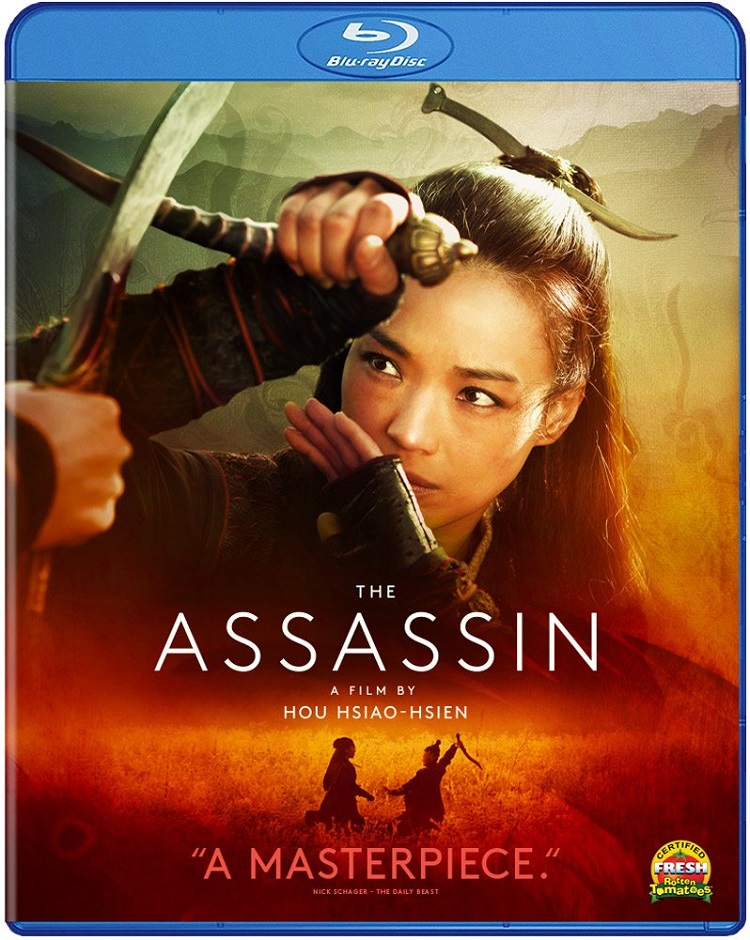
It’s hard when reviewing a movie to admit that you don’t get it. If you have enough ego to broadcast your opinions on films, you probably have enough ego to be sure you have something interesting to say about them. So when a movie confounds you, there can be the temptation to pretend you get what it’s doing, for appearance’s sake. This movie isn’t smarter than me, after all!
Well, The Assassin has confounded me, and I’m not sure if that’s because it was smarter than me, or what it was trying to do was something I am not receptive to. One thing that is clear is this movie has no interest in being a standard modern Chinese martial arts film where a thin plot is used to connect a bunch of awesome choreographed fights together. Its ambitions lie far outside that goal. Just what they are, though, the movie never quite lets the audience know.
The assassin of the title is Yinniang, a girl who was sent away with a nun when another woman came to marry her betrothed, the General, (the back of the box says she was “kidnapped”, but that isn’t terribly clear in the narrative#8230; not that much is clear in this movie.) The nun trained her to be a master of the sword so that, when she returned to the court, she could kill the General who spurned her. Why?
I don’t know. There are levels of familial connections in this movie that eventually, kind of, make sense, and revelations about who is really behind attacks and murders but it is told in the most obtuse, distancing way possible. There’s a deliberate naturalism to the way scenes are shot, and even mic’ed, to keep them from being overly narrative-driven. There is very little underscoring throughout most of The Assassin, and the sound design on many of the scenes keeps the ambient noise, like footsteps, almost as loud as the dialogue.
Several scenes, especially early in the film, are show from behind objects. The General has a concubine whom he truly loves. One very long scene between them is shot almost entirely behind a gauzy curtain. Occasionally, the camera moves a bit to the side, but other things obscure its view. Inconsequential foreground objects are constant getting in the way of the action. Even when the view is clear, the camera takes little interest in what in most films would be the main subject of a scene. In an early fight scene, a group of warriors chases the assassin into a copse of trees. The camera stays a good few dozen yards away, and never follows the action.
Even when the action is foregrounded, it often moves off-screen and is not followed. Throughout the film, information is obscured, plot lines are brought forward in as obtuse as possible a manner, and characters are left unexplained. Near the end of the first hour of the film, Yinniang has a confrontation with a masked woman whom, if I paid attention properly (and that’s a real question, because the film constantly dares you to quit paying attention, by being boring) was in exactly one scene before, a scene of so little consequence that, until I saw them together I’d assumed that the masked woman was, in fact, Yinniang. They do some cool sword tricks, then Yinniang cuts the mask in half. We’re treated to a good solid minute of the two of them staring at each other, waiting for the mask to fall. Then they walk away from each other. If these characters had any emotional reaction to the revelation of who was behind the mask, it’s apparently none of the audience’s damn business.
The director, Hsiao-Hsien Hou, won Best Director at Cannes for this. His choices are clearly deliberate, and it is an unquestionably beautiful movie. Much of the action was shot in uninhabited spaces in China and Mongolia, so they very well may have looked just as they did in the period of the story (8th century AD). There is one shot near the end of the film, where Yinniang talks to her master, which begins with master staring out over a cliff-face. When it ends (several minutes later, in a completely static shot) she is in the same place, and what was once a view of the ocean has been completely covered in fog. The visual is breathtaking, and it might even be emblematic of the emotional state of the characters. One can only guess, because their emotions are left mostly opaque by the narrative.
For anyone seeking rousing martial arts action, this is not the film for you. There are some interesting fight scenes, but they are deliberately neutered of the most important aspect of a cinematic fight: you don’t know who to root for, you’re rarely sure who is who, and the camera does not follow the action. Most martial arts movies are constructed to astonish with athletics and acrobatics, and with the general intent that, at some point, an audience member might even be driven to cheer. This isn’t the intent of The Assassin. That intent would be, it seems, to establish a mood. Which is fine, if the mood led to somewhere. For me, The Assassin did not.
Technically, this Blu-ray release was fine. The film was shot in something close to Academy ratio, so it will not fill out a widescreen (except, for whatever reason, for one scene). It’s all beautifully rendered, though as I described above many of these beautiful scenes are intentionally left obscured by foreground objects. The sound, too, is very deliberately “naturalistic” to the point where I swapped between the uncompressed audio and Dolby 2.0 to see if something was going weird with my speakers. Along with the movie, there are four very brief featurettes (about three minutes a piece) which, for all their brevity contains some decent behind-the-scenes footage and interviews, and don’t waste much of their running time with shots from the film.